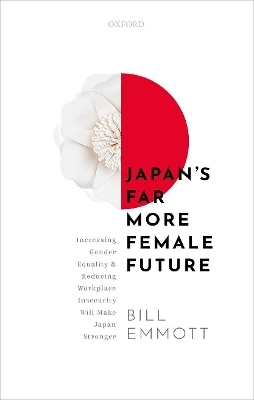
Japan's Far More Female Future
Oxford University Press (Verlag)
9780198865551 (ISBN)
The Japan on show in the 2019 Rugby World Cup was an admirably safe, stable, resilient, and efficient society. However, that appearance disguises crucial vulnerabilities and social ailments, including an ageing and shrinking population, slow productivity growth, a new low-wage, insecure workforce, declining marriage and fertility rates, and an extreme level of gender inequality.
Within this gender gap lies the key both to the ailments and the cure. A deterioration in the use of human capital and a decline in family formation have become entrenched thanks to discrimination against the female half of the population. Yet gradual change is occurring, thanks not only to demographic necessity but also to a significant rise in female access to university education since the 1990s and the emergence of a wide range of role models to inspire and empower the next generation. Analysis of trends and policy options, combined with interviews with 21 role models spanning fields from business to the arts, diplomacy to politics, music to e-commerce, provides ample grounds for optimism. Japan is becoming a nation with an increasing number of potential female leaders. If this rise can be accelerated by both public policy and private action, Japan could achieve much greater social justice and sustainable prosperity in the decades to come.
Bill Emmott is a writer and consultant best known for his 13 years as "editor in chief" of The Economist in 1993-2006, a publication he first joined in 1980 and served in Brussels, Tokyo, and London. He is now chairman of the International Institute for Strategic Studies in London, chairman of the board of Trinity College Dublin's Long Room Hub for Arts & Humanities, and chairman of the Japan Society of the UK. In 2016 the Japanese government awarded him the 'Order of the Rising Sun: Gold Rays with Neck Ribbon' for services to UK-Japan relations. He is the author of 14 books, including most recently The Fate of the West: The Battle to Save the World's Most Successful Political Idea (2017).
Preface
Part One: Human Capital and the Sources of Japan's Vulnerability
1: The Legacy of the Heisei Era, 1989-2019
2: 'A Place in Which Women can Shine?'
Part Two: Success Stories
3: Individuals with a Community Spirit: Baba Kanako, Ishizaka Noriko, and Oikawa Hideko
4: Female Leadership in a Male World: Kono Naho, Higuchi Hiroe, and Terada Chiyono
5: Starting Something New: Toko Fish Atsuko, Hayashi Chiaki, Mitarai Tamako, and Nakamura Noriko
6: Making a Political Impact: Koike Yuriko, Kuniya Hiroko, and Hayashi Fumiko
7: Creating Art, Interpreting Life: Shinoda Toko, Nishimoto Tomomi, and Kawase Naomi
8: Representing Japan, Defending Human Rights: Miyoshi Mari, Osa Yukie
9: Discovering, Developing, Teaching: Kuroda Reiko, Nagoya University, Kawai Eriko and Ogawa Michiko
Part Three: Conclusions and Recommendations
10: The Tasks Ahead
| Erscheinungsdatum | 16.11.2020 |
|---|---|
| Verlagsort | Oxford |
| Sprache | englisch |
| Maße | 148 x 223 mm |
| Gewicht | 376 g |
| Themenwelt | Sozialwissenschaften ► Soziologie ► Gender Studies |
| Sozialwissenschaften ► Soziologie ► Mikrosoziologie | |
| Wirtschaft ► Betriebswirtschaft / Management ► Unternehmensführung / Management | |
| ISBN-13 | 9780198865551 / 9780198865551 |
| Zustand | Neuware |
| Informationen gemäß Produktsicherheitsverordnung (GPSR) | |
| Haben Sie eine Frage zum Produkt? |
aus dem Bereich


